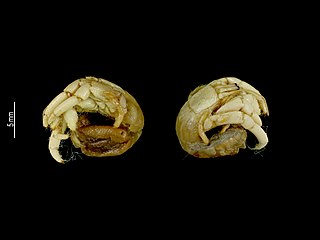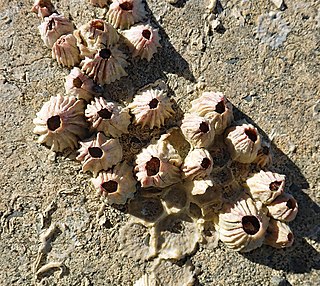
Sacculina is a genus of barnacles that is a parasitic castrator of crabs. They belong to a group called Rhizocephala. The adults bear no resemblance to the barnacles that cover ships and piers; they are recognised as barnacles because their larval forms are like other members of the barnacle class Cirripedia. The prevalence of this crustacean parasite in its crab host can be as high as 50%.
Thompsonia is a genus of barnacles which has evolved into an endoparasite of other crustaceans, including crabs and snapping shrimp. It spreads through the host's body as a network of threads, and produces many egg capsules which emerge through joints in the host's shell.

The Sacculinidae are a family of barnacles belonging to the bizarre parasitic and highly apomorphic infraclass Rhizocephala. The Sacculinidae is one of the two larger families of Rhizocephala, containing six genera:

The Peltogastridae are a family of barnacles belonging to the bizarre parasitic and highly apomorphic infraclass Rhizocephala. The Peltogastridae are by far the largest family of Rhizocephala. They comprise 14 genera, 3 of which were moved from the family Lernaeodiscidae.
The Bopyridae are a family of isopod crustaceans in the suborder Cymothoida. There are 1223 individual species contained in this family. Members of the family are ectoparasites of crabs and shrimp. They live in the gill cavities or under the carapace where they cause a noticeable swelling. Fossil crustaceans have occasionally been observed to have a similar characteristic bulge.
Dipterosaccus is a genus of barnacle.
Pieter Nicolaas van Kampen was a Dutch zoologist.

Atergatis floridus, the floral egg crab, green egg crab or shawl crab, is a species of tropical Indo-Pacific crab from the family Xanthidae. The meat of this crab is toxic, even if cooked, and consumption often results in death.
Oxynaspis is a genus of goose barnacles in the order Lepadiformes.

Heterosaccus is a genus of barnacles in infraclass Rhizocephala. Like other taxa in this group, they parasitize crabs. Geoffroy Smith circumscribed the genus in 1906; he initially only included H. hians. Smith circumscribed a genus distinct from Sacculina due to a difference of the mesentery; in Heterosaccus, the mesentery does not stretch down to the mantle opening but rather only is present on the ring of attachment.
Polyascus is a genus of barnacles in infraclass Rhizocephala. It was circumscribed in 2003 by Henrik Glenner, Jørgen Lützen, and Tohru Takahashi. They included three species, all transferred from Sacculina. The generic name polyascus refers to the typical presence of multiple external sac-like female bodies, known as externae. In Polyascus species, these originate from asexual reproduction.

Clistosaccidae is a family of parasitic barnacles belonging to the bizarre and highly apomorphic infraclass Rhizocephala, which is part of the barnacle subclass Cirripedia.

Calanticomorpha is an order of acorn barnacles in the class Thecostraca. There are 3 families and more than 90 described species in Calanticomorpha.

Notobalanus is a genus of acorn barnacles in the family Balanidae. There are at least two described species in Notobalanus.

Eutomolasma is a genus of symmetrical sessile barnacles in the family Pachylasmatidae. There are at least four described species in Eutomolasma.

Pachylasma is a genus of symmetrical sessile barnacles in the family Pachylasmatidae. There are about eight described species in Pachylasma.

Peltogasterella is a genus of parasitic barnacles in the family Peltogasterellidae. There are at least four described species in Peltogasterella.
Parthenopea is a genus of parasitic barnacles in the family Parthenopeidae, the sole genus of the family. There are at least three described species in Parthenopea.

Triangulus is a genus of parasitic barnacles in the family Triangulidae, the sole genus of the family. There are at least four described species in Triangulus.











